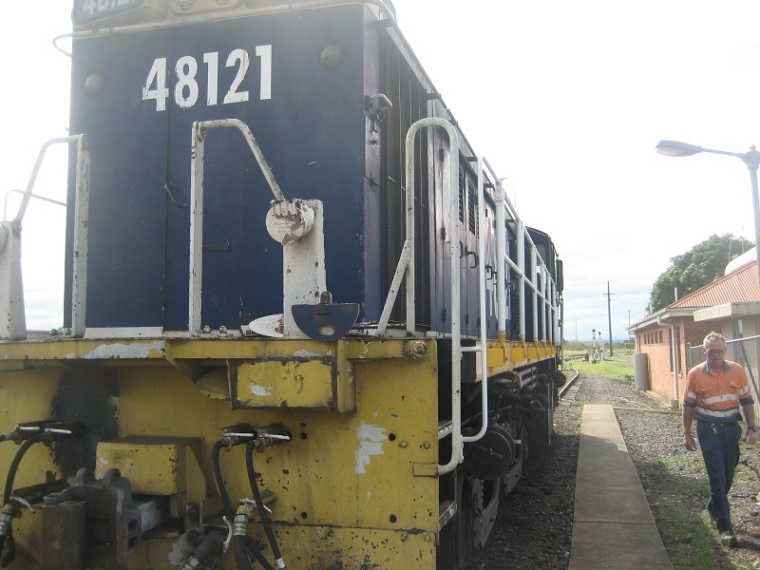

My career as a locomotive engineman began in July 1968. As a sixteen year old, I left home in Canberra and relocated to Goulburn, the closest round house where trainee enginemen could enter Acting Fireman School when they turned seventeen and a half.
In that 17 month period I became well versed on the various steam and diesel locomotives that came to the round house, so when Acting Fireman School finally came around, I was fired-up to do well.
After Acting Fireman School, I could then be instructed by the Locomotive Inspector, who illustrated the practical tasks associated with preparing a steam locomotive for a road duty. This included techniques in getting the fire going with oiled rags, coaling it to full steam, oiling the wheels and motions (which involved climbing down into the pit under the engine), oiling components and such like.
This was followed by two trips on the 'road' under instruction by the Locomotive Inspector. I had a 36 class steam engine which hauled an all-stop shunting freight train from Goulburn to Moss Vale. After barracks, I worked a 42 Class diesel which hauled a similar freight train back to Goulburn.
The final component of the Acting Fireman qualification was to spend two weeks 'on the road' as a fireman without being accompanied by a Locomotive Inspector. There were three roster systems; the first was for senior drivers and fireman, who were on the Salaried Roster (express passenger and fast freighters); the second was the 'Forecast' roster (regular freight trains); while the third was the 'rouse-about' roster as in reality, many trains ran only when there was available freight.
Those drivers and fireman were advised day by day when to come on duty. I was placed on this 'rouse-about' roster.

First main line job
Yes, I was very excited for my first turn of duty. I was to work a freight train from Goulburn to Junee signing on at 9.00pm that first night. This was a barracks job, so I prepared my Gladstone bag with sandwiches, fruit, meat and vegetables for a 24 hour period away from home. I had no idea what train this might be, possibly a fast freighter hauled by two large diesel locomotives, my imagination ran wild.
Alas, it turned out to be an all night sitter; an all-stop shunting freight train, hauled by two 48 Class light freight locomotives hauling four-wheeled wagons which were restricted to 40 miles an hour. My duty was to call every main line signal to the driver as the 48 Class has a high nose preventing the driver seeing around the curbs. And every little siding we shunted off a wagon and picked one up. I had to be alert.
At Harden we were put into a side road for shunting, and to allow several express freighters to pass through. At Cootamundra the same thing occurred and then we continued on to some 40 minutes from Junee, where we put into another siding. This allowed the Southern Aurora and Spirit of Progress to pass through. Finally the harbingers of the dawn emerged and we slowly but surely made our way into Junee arriving at 6.30am.
It was a long, long night. I struggled to stay awake. In barracks, it was straight to bed. I was dead beat.

Character building
The Good Book has a lot to say about character and character building. I've often thought of that first all night trip.
How easy it would have been to fall asleep with the rocking of the 48 Class diesel and the sound of the engine. I was determined to stay awake and alert. Nothing was going to deter me. My driver congratulated me on my conscientiousness. I called every signal. I chatted to him (helped his alertness too). It was character building.
The greatest test of character by any human being was that of Jesus Christ (fully human, fully God) who died for my (our) sin on the Cross and was then resurrected for my own assurance of Salvation.
Jesus' test of character challenged the very essence of life itself. His sacrifice wasn't just his own, it was for every person and that includes me. My earnest prayer is that I might even in a small way live for others in a sacrificial way.

Dr Mark Tronson is a Baptist minister (retired) who served as the Australian cricket team chaplain for 17 years (2000 ret) and established Life After Cricket in 2001. He was recognised by the Olympic Ministry Medal in 2009 presented by Carl Lewis Olympian of the Century. He mentors young writers and has written 24 books, and enjoys writing. He is married to Delma, with four adult children and grand-children. Dr Tronson writes a daily article for Christian Today Australia (since 2008) and in November 2016 established Christian Today New Zealand.
Mark Tronson's archive of articles can be viewed at http://www.pressserviceinternational.org/mark-tronson.html